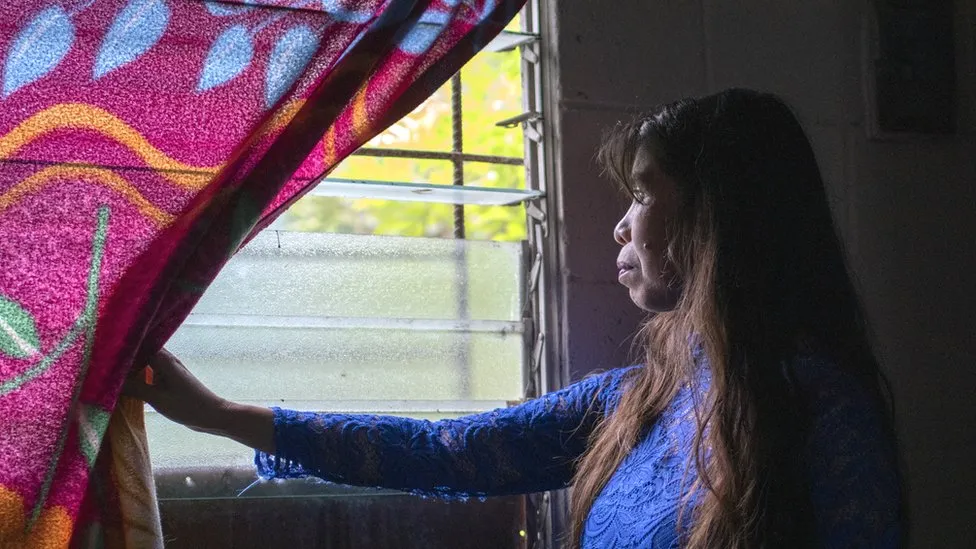El Salvador gangs: Derelict gang houses given to locals
The former gang stronghold of La Campanera in El Salvador's capital, San Salvador, is dotted with empty houses.

Some were so-called "casas destroyer", houses the gangs used for rape, murder and torture. Others were abandoned when their owners fled the endless gang violence, and then occupied by the gangs for their families to live in or stripped for materials.
Now, as part of a new social housing plan to compliment his harsh security policy, the administration of El Salvador's president, Nayib Bukele, has started to reclaim derelict gang houses, to turn them over to local residents.
Primary school teacher Audelia Rosales received her house with the help of a low-interest government loan.
She shows me the refurbishments they are making on the modest house, including patching up a hole in the wall which the gangs used as an escape route whenever the police raided the neighbourhood.
Living in La Campanera since the 1990s and watching the gangs grow in strength and number was tough, says Audelia.
"We lost our freedom. My children couldn't play in the street or in the parks. They grew up cooped up inside, their whole childhoods."
Audelia says that following the arrest of more than 65,000 people since the government crackdown on gangs started a year ago, her long-suffering neighbourhood is starting to shed its violent image.
"For years, I never said where I lived. People often couldn't find work, there was such stigma about living here. But now I say it proudly: I'm from La Campanera!", she laughs.
Normal life is gradually returning to such districts. Fast-food delivery couriers have reappeared in what were once no-go zones for outsiders and the police.
And nearby, a mid-morning game of football is taking place between teenagers from adjacent neighbourhoods.
While that might not sound like something special, the game between San Antonio and San Jose's youth teams is remarkable.
The two areas used to be controlled by rival splinter groups of El Salvador's notorious 18th Street gang - the Sureños and the Revolucionarios.
Children from one side could not even enter the opposing neighbourhood, much less hold a game of football.
Now regular matches take place on San Antonio's scruffy artificial pitch.
"This new security is here to stay", says Erik, one of the coaches. "Many of those gang members will be in jail until they're 90, 100 [years old], or won't ever be let out. This generation will grow up in a healthier, gang-free environment."
The military-led crackdown has done more than just bring back civic pride and sports to former gang strongholds.
It has had a huge impact on crime across El Salvador, and the murder rate - once considered the highest in the world - has plummeted.
Yet it is probably the most controversial security policy in the Americas. Human rights organisations say thousands of people with no gang ties have been arbitrarily detained, often on the flimsiest of pretexts.
One night last May, the police knocked on the door of labour union leader Dolores Almendares and took her away - based, they told her, on an anonymous tip off.
She describes being kept in horrific prison conditions, including chronically overcrowded cells with just one toilet for more than 230 people. Dolores says her treatment amounted to "torture".
The Bukele administration says the International Committee of the Red Cross (ICRC) has been granted access to the jails, and the ICRC in El Salvador confirms it has carried out regular checks on prison conditions.
However, the ICRC's findings and recommendations (based on observations during the state of exception imposed by the government of President Bukele) remain confidential.
Dolores is adamant her arrest was unconstitutional and illegal.
"It was a kidnapping by the state. If you've done something wrong, then you have to pay - but if you haven't, it's privation of liberty, and that's kidnapping. I'd committed no crime, so I shouldn't have been in prison," she argues.
I put Dolores's point to Justice and Security Minister Gustavo Villatoro in an exclusive interview.
"We are not capturing innocent people," he said. "We don't want to arrest anyone who offered the gangs support, but who did so because they had no choice. What we're currently analysing is whether those who collaborated with the gangs did so because they were trying to become a gang member or had been forced to provide them with support."
Dolores is unimpressed by the official justification for her detention. "I hate this government," she says simply.
"They should investigate people using the constitution. They're supposed to set a good example. They won't eradicate violence if they generate more violence themselves."
For years, the streets gangs ruled El Salvador under a chilling motto of control: "See, hear, shut up."
One resident told me that, for him, it meant "see how we murder and extort people, hear their cries as we torture them, keep your mouths shut."
Having endured such a reign of terror, Audelia Rosales does not question the methods by which the peace she is now enjoying has been achieved.
Rather, she is just relieved that she can finally step out of her house after dark and take in the cool evening air.
"For 16 years my mother couldn't even visit us here - we barely saw her," she explains, sitting on a park bench watching local children play baseball.
"I hope the next generation gets to experience this freedom too."
-bbc







